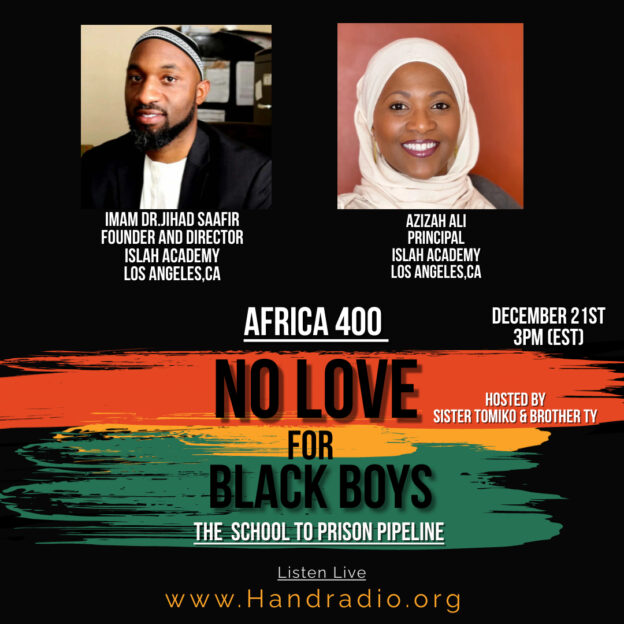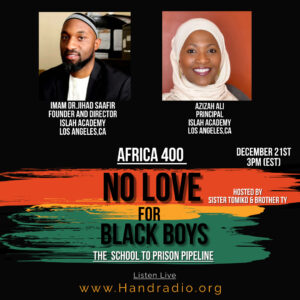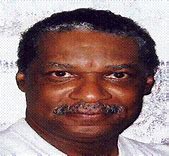 I first met Baba Marshall “Eddie” Conway in 1998. I had become familiarized with his case as a result in my membership in the Organization of All Afrikan Unity-Black Panther Cadre (OAAU-BPC) under the leadership of Baba Ade Oba Tokunbo from 1994. In that organization, much of the mystery of the Panthers was lifted from my up-to-then confused mind, and the plight of America’s Political Prisoners was gradually revealed to me. OAAU-BPC’s main contribution to the issue of Political Prisoners was their direct involvement in the campaign to win the exoneration and freedom of Marshall “Eddie” Conway, a US Army Veteran (as many Panthers were) and a leader in the Baltimore Chapter of the Black Panther Party for Self-Defense. Baba Eddie, as I had come to call him, had exposed the existence of police agents within the Baltimore organization, and had informed Panther leadership in New York and the Bay Area of the degree if infiltration of the Baltimore organization by the Baltimore City Police Red Squad and probably other intelligence operatives. For this, Baba Eddie was targeted. He was arrested at his job at the Main Post Office in Baltimore in April 1970 and accused of
I first met Baba Marshall “Eddie” Conway in 1998. I had become familiarized with his case as a result in my membership in the Organization of All Afrikan Unity-Black Panther Cadre (OAAU-BPC) under the leadership of Baba Ade Oba Tokunbo from 1994. In that organization, much of the mystery of the Panthers was lifted from my up-to-then confused mind, and the plight of America’s Political Prisoners was gradually revealed to me. OAAU-BPC’s main contribution to the issue of Political Prisoners was their direct involvement in the campaign to win the exoneration and freedom of Marshall “Eddie” Conway, a US Army Veteran (as many Panthers were) and a leader in the Baltimore Chapter of the Black Panther Party for Self-Defense. Baba Eddie, as I had come to call him, had exposed the existence of police agents within the Baltimore organization, and had informed Panther leadership in New York and the Bay Area of the degree if infiltration of the Baltimore organization by the Baltimore City Police Red Squad and probably other intelligence operatives. For this, Baba Eddie was targeted. He was arrested at his job at the Main Post Office in Baltimore in April 1970 and accused of 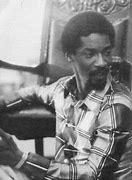 murdering a Baltimore City police officer and seriously injuring another. Despite Baba Eddie’s protestation of innocence and a lack of any physical evidence linking him to the case, he was convicted and sentenced to life in prison. It was in prison, at the Maryland House of Correction in Jessup, Maryland, not-so-affectionately known as “The Cut”, that I met Baba Eddie. I had talked with him over the phone a couple of times, and I was at “The Cut” specifically to meet him and be introduced to the Writers’ Club, a group of inmates who used prose, poetry and other literary pursuits to help them heal their psyches and, for those who could look forward to release one day, prepare them to better cope with the world outside. I was impressed with the calm that Baba Eddie exuded, and I wrote about my encounter with him in the newsletter I was writing at the time (KUUMBAReport), along with an explanation of his case from Nana Njingha, also a member of the Baltimore Chapter, a testimonial by Baba Paul Coates, another member of that Chapter and now founder of Black Classic Press; commentaries by fellow Political Prisoner Mumia Abu-Jamal and The MOVE Organization; and a short commentary by Baba Eddie himself. I would begin to sign off on emails, letters and radio shows by wishing everyone “Peace and Power” in large part because of inspiration by Baba Eddie’s example.
murdering a Baltimore City police officer and seriously injuring another. Despite Baba Eddie’s protestation of innocence and a lack of any physical evidence linking him to the case, he was convicted and sentenced to life in prison. It was in prison, at the Maryland House of Correction in Jessup, Maryland, not-so-affectionately known as “The Cut”, that I met Baba Eddie. I had talked with him over the phone a couple of times, and I was at “The Cut” specifically to meet him and be introduced to the Writers’ Club, a group of inmates who used prose, poetry and other literary pursuits to help them heal their psyches and, for those who could look forward to release one day, prepare them to better cope with the world outside. I was impressed with the calm that Baba Eddie exuded, and I wrote about my encounter with him in the newsletter I was writing at the time (KUUMBAReport), along with an explanation of his case from Nana Njingha, also a member of the Baltimore Chapter, a testimonial by Baba Paul Coates, another member of that Chapter and now founder of Black Classic Press; commentaries by fellow Political Prisoner Mumia Abu-Jamal and The MOVE Organization; and a short commentary by Baba Eddie himself. I would begin to sign off on emails, letters and radio shows by wishing everyone “Peace and Power” in large part because of inspiration by Baba Eddie’s example.
I would get to see him two more times, I think, before an incident at “The Cut” led to a lockdown and a stop to all visits for a while. Still, the effort to secure his exoneration and release continued. The Marshall Eddie Conway Support Committee had been formed under the guidance of his first wife, Nana Njingha, who continued to tirelessly champion his cause. This was a group of dedicated Pan-Afrikanists and Black Nationalists who were committed to seeing Baba Eddie go free. There was also the Friends of Eddie Conway, an integrated group that included several White “allies” who shared many of the revolutionary beliefs of the Black Panther Party and supported freedom for all Political Prisoners. These groups had a connection with the larger national organization 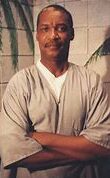 known as Jericho, which advocated for the hundreds of Political Prisoners being held in penitentiaries, prisons and jails in the US, from Mumia Abu-Jamal and MOVE in Philadelphia, to Indigenous First Nations Political Prisoner Leonard Peltier and the American Indian Movement (AIM), to White Political Prisoners such as Thomas Manning and Marilyn Buck, to Panthers imprisoned across the country that included Dr. Mutulu Shakur, Sundiata Acoli, Romaine “Chip” Fitzgerald, Veronza Bowers, Hugo “Yogi” Pinnell, Wopashitwe Mondo Eyen we Langa and Ed Poindexter, to exiles such as Assata Shakur, and of course to Baba Eddie.
known as Jericho, which advocated for the hundreds of Political Prisoners being held in penitentiaries, prisons and jails in the US, from Mumia Abu-Jamal and MOVE in Philadelphia, to Indigenous First Nations Political Prisoner Leonard Peltier and the American Indian Movement (AIM), to White Political Prisoners such as Thomas Manning and Marilyn Buck, to Panthers imprisoned across the country that included Dr. Mutulu Shakur, Sundiata Acoli, Romaine “Chip” Fitzgerald, Veronza Bowers, Hugo “Yogi” Pinnell, Wopashitwe Mondo Eyen we Langa and Ed Poindexter, to exiles such as Assata Shakur, and of course to Baba Eddie.
The following report, from the group Justice For Eddie Conway, was reprinted in the January-February 2001 issue of KUUMBAReport:
Justice for Marshall Eddie Conway January February 2001
I’m sure there were those of us who believed that Baba Eddie would never be released from prison. The opponents of Political Prisoners, despite the usual lack of conclusive evidence, the use of suspect jailhouse informants, the withheld exculpatory evidence, the manufactured evidence, the contradicted and often blatantly false testimony, the police and judicial misconduct and the denial of competent legal representation to the defendants, were many, were in places of political power, and were adamant that despite all the indications that the trials were unfair at best, that they had their man (and sometimes their woman), that justice had been served (at least to their satisfaction), and that these “criminals” should never see the light of day. Still, after much legal maneuvering and wrangling, Baba Eddie was finally released from prison on parole on March 4, 2014 after 43 years and 10 months of imprisonment.
His release had been prompted by several previous events. A few years earlier, Jack Johnson, who was also convicted in connection to the police officer’s murder, was released from prison on compassionate parole. Another domino dropped when a Maryland Court of Appeals ruled in the case Unger v. State in May 2012, which bolstered the argument that in Baba Eddie’s trial, the jury instructions had violated his Constitutional rights to due process, as reported in an article on the Web site of Truthout (https://truthout.org/articles/political-prisoner-marshall-eddie-conway-released-from-prison-after-44-years/):
Despite Eddie Conway’s insistence on his innocence, it took years for Conway and his attorneys to find a way to overturn his conviction. Finally, in May 2012, the Maryland Court of Appeals ruled in the case of Unger v. State that a Maryland jury, to comply with due process as stated in the US Constitution, must be convinced beyond a reasonable doubt that someone charged with a crime is guilty before that jury can convict the defendant. What made this decision momentous for many people in prison, including Conway, is that it applied retroactively.
Robert Boyle and Phillip G. Dantes, attorneys for Conway, filed a motion on his behalf based on this ruling, arguing that the judge in Conway’s trial had not properly instructed the jury that this “beyond a reasonable doubt” proviso was mandatory for conviction. Based on this motion, they negotiated an agreement whereby Conway would be resentenced to time served and be released from prison. In exchange, Conway and his lawyers agreed not to litigate his case based on the Unger ruling.
Since his release, Baba Eddie lived a relatively quiet life compared to the 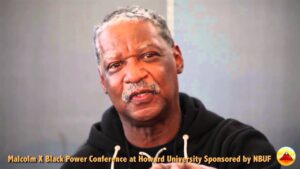 revolutionary activism of his youth, but he continued to work on behalf of the rights of the people and the truth. He began working at The Real News in Baltimore (https://therealnews.com/), his most prolific work being on regular programs such as “Rattling The Bars”, which he hosted with fellow former Political Prisoner Mansa Musa to “put the voices of the people most harmed by our system of mass incarceration at the center of our reporting on the fight to end it.” In the meantime, he had an opportunity to enjoy those moments life still had for him with his second wife, Dominique, who also worked with him on several programs centered on prisoners and on youth, and with his extended family.
revolutionary activism of his youth, but he continued to work on behalf of the rights of the people and the truth. He began working at The Real News in Baltimore (https://therealnews.com/), his most prolific work being on regular programs such as “Rattling The Bars”, which he hosted with fellow former Political Prisoner Mansa Musa to “put the voices of the people most harmed by our system of mass incarceration at the center of our reporting on the fight to end it.” In the meantime, he had an opportunity to enjoy those moments life still had for him with his second wife, Dominique, who also worked with him on several programs centered on prisoners and on youth, and with his extended family.
I had one more chance to visit with Baba Eddie at his office at The Real News in Baltimore, where he showed me around the building, which was still expanding, and asked me about my continuing activist work since I had visited him in The Cut. I hope my answers to him about my activities in the intervening years were satisfactory to him.
I would see him in person two more times, at the intersection of North and Pennsylvania Avenues during the 2015 protests against the police murder of Freddie Gray, and later at an event about the community and the police at Ida B’s Table, an eatery and cultural meet spot that was named after legendary civil rights activist Ida B. Wells in The Real News Building that was still under construction when I was there before. I did not have an opportunity to speak at length with Baba Eddie at these events, but he seemed well and at peace with his long, tortuous journey through life as an activist and the personal price he was forced to pay for his commitment.
Over the last few months, I had heard that he was dealing with health issues, problems that he had been confronted by for years from the time of his imprisonment, but the quiet strength and dignity with which he had handled himself, at least outwardly, led me to believe that he would overcome these challenges and come out the other side swinging. It came as a shock to me to hear on Monday, February 13, that Baba Eddie had transitioned to the Honored Ancestors in Long Beach, California. At this point, the real toll of decades of political imprisonment hit home. Baba Eddie was robbed of over four decades of freedom, locked away in the infamous “Cut”, and in the end, this undoubtedly led to health problems that would end his life well before it should have happened.
In the end, our hearts ache that Baba Eddie is no longer with us on the physical plane. We were gratified that he at least had almost nine years to breathe the free air before his transition. Several of our Political Prisoners who were finally released had only a few months to enjoy their freedom, and some sadly died in prison. The community at least had the opportunity to honor Baba Eddie and show our appreciation for his incredible work and sacrifice, allowing him to receive at least some of his flowers while he was still among us. Baba Eddie leaves behind a number of family, friends, followers, associates and admirers, but he also leaves behind a great legacy of commitment, struggle and love of the people. May we all strive to approach the level of commitment Baba Eddie showed for truth, justice and righteousness.
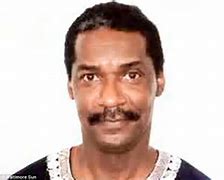 Below are several links to just a few of the articles, videos and podcasts that have been produced to pay tribute to Baba Eddie:
Below are several links to just a few of the articles, videos and podcasts that have been produced to pay tribute to Baba Eddie:
Marshall “Eddie” Conway (1946-2023): A life committed to the people and revolutionary change, Liberation News, https://www.liberationnews.org/marshall-eddie-conway-1946-2023-a-life-committed-to-the-people-and-revolutionary-change/
Marshall Eddie Conway, former Black Panther imprisoned for 44 years, dies at 76, Radio Havana Cuba, https://www.radiohc.cu/en/noticias/internacionales/313730-marshall-eddie-conway-former-black-panther-imprisoned-for-44-years-dies-at-76
Marshall “Eddie” Conway, Former Black Panther Imprisoned for 44 Years, Dies at 76, DemocracyNow!, https://www.democracynow.org/2023/2/14/headlines/marshall_eddie_conway_former_black_panther_imprisoned_for_44_years_dies_at_76
Tribute to Marshall “Eddie” Conway, Black Power Rewind, https://www.youtube.com/live/RIXRIIdZhq4?feature=share

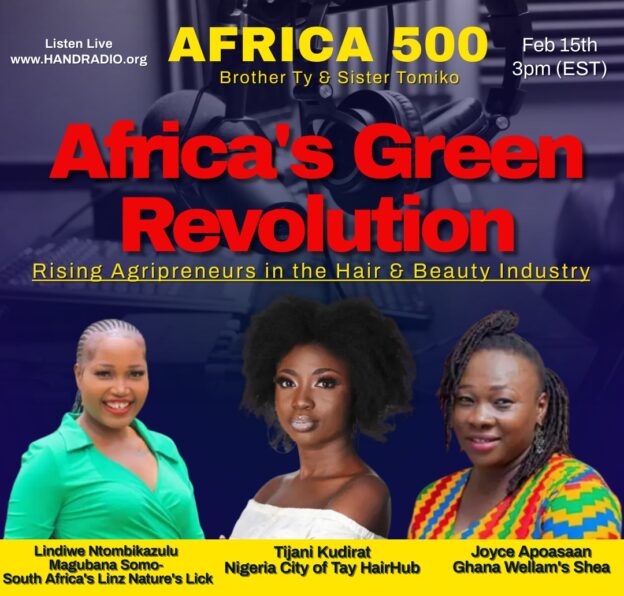
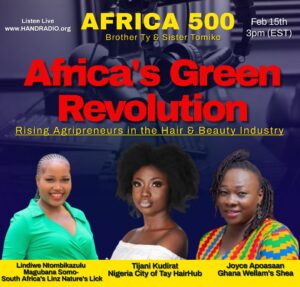 The Wednesday, February 15, 2023 edition of Africa 500 features African Women Entrepreneurs who are helping to drive the Continent’s “Green Revolution”. Show hosts Sis. Tomiko and Bro. Ty welcome African Women “agripreneurs” Lindiwe Ntombikazulu Somo, Kudirat “Ayo” Ayomide Tijani and Joyce Apoasaan Jambeidu.
The Wednesday, February 15, 2023 edition of Africa 500 features African Women Entrepreneurs who are helping to drive the Continent’s “Green Revolution”. Show hosts Sis. Tomiko and Bro. Ty welcome African Women “agripreneurs” Lindiwe Ntombikazulu Somo, Kudirat “Ayo” Ayomide Tijani and Joyce Apoasaan Jambeidu. Lindiwe Ntombikazulu Magubane Somo lives in South Africa. She is the founder and CEO of Ntombi and Rano Trading, which is an umbrella which holds few other companies beneath it. Three Sister’s Poultry deals in farming, poultry and vegetables. She has Diploma in Marketing Management at Stanford College, Advanced
Lindiwe Ntombikazulu Magubane Somo lives in South Africa. She is the founder and CEO of Ntombi and Rano Trading, which is an umbrella which holds few other companies beneath it. Three Sister’s Poultry deals in farming, poultry and vegetables. She has Diploma in Marketing Management at Stanford College, Advanced  Diploma in Agriculture, Certificate in Supply Chain Management with Cape Peninsula University, Certificate with Nosa in Health and Safety Management, Advanced Diploma in Media Studies from an Institute in Ireland.
Diploma in Agriculture, Certificate in Supply Chain Management with Cape Peninsula University, Certificate with Nosa in Health and Safety Management, Advanced Diploma in Media Studies from an Institute in Ireland. In the year 2021 she was nominated amongst 1500 applicants around Africa as a leader for the program called Ignite by Guzakuza in Ghana partnered with London Academy in the UK. Lindiwe is also a Woman in Agriculture Award Nominee for the year 2022. Lindz Nature’s Lick manufactures organic skin care products and also deals in clothing.
In the year 2021 she was nominated amongst 1500 applicants around Africa as a leader for the program called Ignite by Guzakuza in Ghana partnered with London Academy in the UK. Lindiwe is also a Woman in Agriculture Award Nominee for the year 2022. Lindz Nature’s Lick manufactures organic skin care products and also deals in clothing. Kudirat Ayomide Tijani aka Ayo lives in Kwara State in Nigeria but was born in Lagos. She graduated in Agricultural Economics from Obafemi Awolowo University Osun state.
Kudirat Ayomide Tijani aka Ayo lives in Kwara State in Nigeria but was born in Lagos. She graduated in Agricultural Economics from Obafemi Awolowo University Osun state. learned the importance of Organic Agriculture and its impact on the world. Organic Agriculture in Nigeria is just gaining ground and to fast-track its growth it’s important to leverage technology in order to make it attractive to the youth. Ayo is an evangelist when it comes to organic Agriculture because of its effect on the well-being of humans. If food is going to be medicine for mankind then it must be healthy.
learned the importance of Organic Agriculture and its impact on the world. Organic Agriculture in Nigeria is just gaining ground and to fast-track its growth it’s important to leverage technology in order to make it attractive to the youth. Ayo is an evangelist when it comes to organic Agriculture because of its effect on the well-being of humans. If food is going to be medicine for mankind then it must be healthy. She is a Social Media Manager & Marketer, and Creative Director of Cityoftayhairhub a hair care brand. City Of Tayhairhub is a hair care brand totally focused on helping Men and Women of the curly & kinky hair type embrace their curl patterns through informational materials and effective organic hair care products thus making them confident through their hair and passing the baton to the incoming generation. Her products can be found at IG @cityoftayhairhub
She is a Social Media Manager & Marketer, and Creative Director of Cityoftayhairhub a hair care brand. City Of Tayhairhub is a hair care brand totally focused on helping Men and Women of the curly & kinky hair type embrace their curl patterns through informational materials and effective organic hair care products thus making them confident through their hair and passing the baton to the incoming generation. Her products can be found at IG @cityoftayhairhub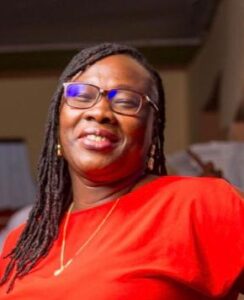 Joyce Apoasaan Jambeidu is Ghanaian from Garu in the Upper East Region. Her dream is to inspire women to make an impact in their chosen fields, to reduce poverty among women through creation of decent jobs.
Joyce Apoasaan Jambeidu is Ghanaian from Garu in the Upper East Region. Her dream is to inspire women to make an impact in their chosen fields, to reduce poverty among women through creation of decent jobs. She has a BA in Integrated Development Studies, an MBA in Project Management and awaiting her thesis Defense for Mphil in Community Health and Development. She is also pursuing a PHD in Project Management with Taxila American University. Joyce currently works as a Governance Lead with USAID RING II, before joining RING II she worked with USAID
She has a BA in Integrated Development Studies, an MBA in Project Management and awaiting her thesis Defense for Mphil in Community Health and Development. She is also pursuing a PHD in Project Management with Taxila American University. Joyce currently works as a Governance Lead with USAID RING II, before joining RING II she worked with USAID  Advancing Nutrition as an Early Childhood Development Specialist, she has also worked with Lively Minds Project, ActionAid – Global Platforms, USAID SPRING – Ghana and World Vision Ghana.
Advancing Nutrition as an Early Childhood Development Specialist, she has also worked with Lively Minds Project, ActionAid – Global Platforms, USAID SPRING – Ghana and World Vision Ghana. worker, she had the privilege to work in many rural communities with women groups with the aim to reduce malnutrition among children and women in reproductive age. She is also the Executive Director of Tieltaab Ghana – an NGO operating in the area of Food and Nutrition Security, Early Childhood Development, Gender and Social Inclusion, WASH and Environmental Protection. Tieltaab Ghana operates The Empowered Woman Hub with the aim to ignite and inspire women to make an impact in society through various initiatives.
worker, she had the privilege to work in many rural communities with women groups with the aim to reduce malnutrition among children and women in reproductive age. She is also the Executive Director of Tieltaab Ghana – an NGO operating in the area of Food and Nutrition Security, Early Childhood Development, Gender and Social Inclusion, WASH and Environmental Protection. Tieltaab Ghana operates The Empowered Woman Hub with the aim to ignite and inspire women to make an impact in society through various initiatives. Wellam’s Shea was formed to economically empower girls, women and entire communities which will contribute to improved nutritional status of children under 5 and women of reproductive age through decent job creation in the shea value chain. Her hair and beauty products can be found at IG @wellamshea and FB Wellam’s Shea
Wellam’s Shea was formed to economically empower girls, women and entire communities which will contribute to improved nutritional status of children under 5 and women of reproductive age through decent job creation in the shea value chain. Her hair and beauty products can be found at IG @wellamshea and FB Wellam’s Shea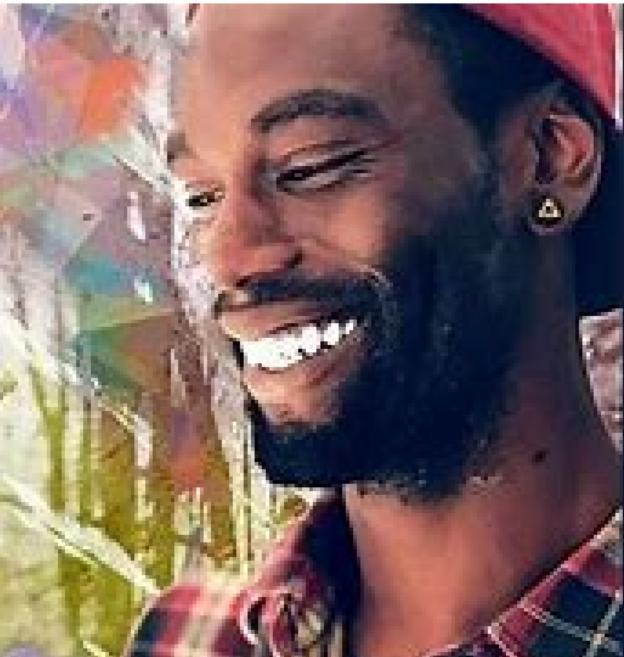
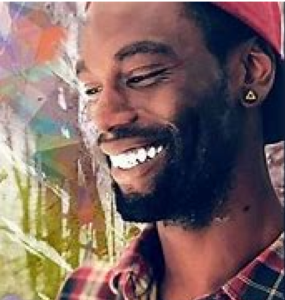 The police apologists will once again insist that “these are just a few bad apples” and that “99.9 percent of police do their jobs honorably and with respect for citizens.” How is it, then, that people of Afrikan descent seem to so often encounter that 0.1 percent of police who are violent, corrupt and racist? How was Oscar Grant killed while he was handcuffed, face down, on a Bay Area Rapid Transit platform as he was telling his friends to comply with police? How was Philando Castille gunned down in his own car, in front of his lady and their child, for politely informing the officer that he was in legal possession of a firearm according to Minnesota’s gun laws? How do we wind up with cases such as those of Abner Louima (who survived being sodomized in 1997 by four New York police officers in a precinct bathroom), Amadou Diallo (who was shot 19 times and killed February 4, 1999 — 24 years ago practically to the day — by plainclothes police for entering the apartment building where he lived), Breonna Taylor (killed in her sleep in a hail of bullets), Sandra Bland (killed in a jail cell after a bogus traffic stop), Tamir Rice (killed for playing with a toy gun alone in a park), John Crawford III (killed for shopping in the gun aisle at an Ohio Walmart), Elijah McClain (injected with ketamine and killed by officers who accosted him for Walking While Black) — and these are just some of the victims who never posed any threat to police and were not even breaking the law — and so many others? How was Ronald Madison, a 45-year-old developmentally disabled man, shot multiple times in New Orleans in the wake of Hurricane Katrina by a police unit that then tried to cover up their crime by claiming he was a violent drug dealer who shot at them first? How was Rayshard Brooks shot in the back as he was running from police in an Atlanta, Georgia fast-food drive-thru? How was Walter Scott shot in the back in North Charleston, South Carolina as he was running from a police officer? How did we end up with Eric Garner being strangled with an illegal chokehold on a New York City street by Daniel Pantaleo and over half a dozen other police as he cried “I can’t breathe” and George Floyd’s throat being crushed by Derek Chauvin and three other Minneapolis police as he begged for his life? How did Freddie Gray end up dying from a broken neck for simply running from Baltimore City police when they stared at him? And now, how did five Memphis police get it into their heads to beat Tyre Nichols literally to death? No, these are not just a few bad apples. To paraphrase a 1990 commentary about racist right-wing politicians by Dr. Julianne Malveaux, this is five rotten apples that have not fallen far from a rotting tree.
The police apologists will once again insist that “these are just a few bad apples” and that “99.9 percent of police do their jobs honorably and with respect for citizens.” How is it, then, that people of Afrikan descent seem to so often encounter that 0.1 percent of police who are violent, corrupt and racist? How was Oscar Grant killed while he was handcuffed, face down, on a Bay Area Rapid Transit platform as he was telling his friends to comply with police? How was Philando Castille gunned down in his own car, in front of his lady and their child, for politely informing the officer that he was in legal possession of a firearm according to Minnesota’s gun laws? How do we wind up with cases such as those of Abner Louima (who survived being sodomized in 1997 by four New York police officers in a precinct bathroom), Amadou Diallo (who was shot 19 times and killed February 4, 1999 — 24 years ago practically to the day — by plainclothes police for entering the apartment building where he lived), Breonna Taylor (killed in her sleep in a hail of bullets), Sandra Bland (killed in a jail cell after a bogus traffic stop), Tamir Rice (killed for playing with a toy gun alone in a park), John Crawford III (killed for shopping in the gun aisle at an Ohio Walmart), Elijah McClain (injected with ketamine and killed by officers who accosted him for Walking While Black) — and these are just some of the victims who never posed any threat to police and were not even breaking the law — and so many others? How was Ronald Madison, a 45-year-old developmentally disabled man, shot multiple times in New Orleans in the wake of Hurricane Katrina by a police unit that then tried to cover up their crime by claiming he was a violent drug dealer who shot at them first? How was Rayshard Brooks shot in the back as he was running from police in an Atlanta, Georgia fast-food drive-thru? How was Walter Scott shot in the back in North Charleston, South Carolina as he was running from a police officer? How did we end up with Eric Garner being strangled with an illegal chokehold on a New York City street by Daniel Pantaleo and over half a dozen other police as he cried “I can’t breathe” and George Floyd’s throat being crushed by Derek Chauvin and three other Minneapolis police as he begged for his life? How did Freddie Gray end up dying from a broken neck for simply running from Baltimore City police when they stared at him? And now, how did five Memphis police get it into their heads to beat Tyre Nichols literally to death? No, these are not just a few bad apples. To paraphrase a 1990 commentary about racist right-wing politicians by Dr. Julianne Malveaux, this is five rotten apples that have not fallen far from a rotting tree.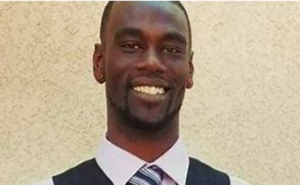
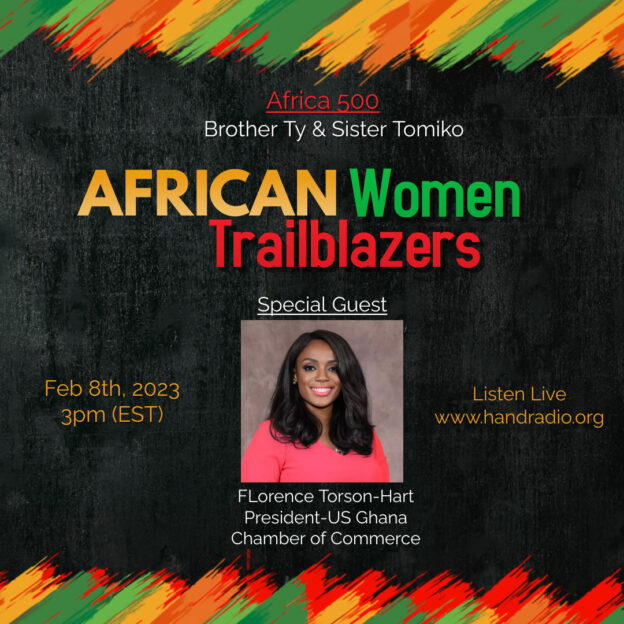
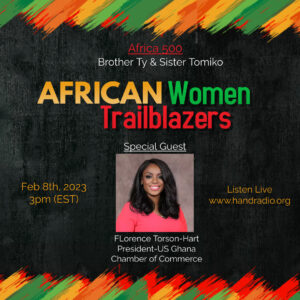 The February 8, 2023 edition of Africa 500 spotlights African women trailblazers in business. Show hosts Sis. Tomiko and Bro. Ty welcome African business woman Florence Torson-Hart.
The February 8, 2023 edition of Africa 500 spotlights African women trailblazers in business. Show hosts Sis. Tomiko and Bro. Ty welcome African business woman Florence Torson-Hart.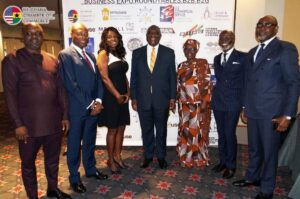
 Florence Torson-Hart is the current President of the US-Ghana Chamber of Commerce headquartered in Philadelphia PA. The Chamber is dedicated to the facilitation and promotion of trade & investment, economic growth, increasing business opportunities and advocacy on behalf of its membership in both countries.
Florence Torson-Hart is the current President of the US-Ghana Chamber of Commerce headquartered in Philadelphia PA. The Chamber is dedicated to the facilitation and promotion of trade & investment, economic growth, increasing business opportunities and advocacy on behalf of its membership in both countries.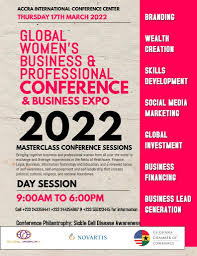
 She also leads a Wealth Management Team at Merrill Lynch and is a Certified Financial Planner. Prior to joining Merrill Lynch, Florence was the CEO and Founder of a successful multi-media company. She has extensive experience in Advertising, Public Relations,
She also leads a Wealth Management Team at Merrill Lynch and is a Certified Financial Planner. Prior to joining Merrill Lynch, Florence was the CEO and Founder of a successful multi-media company. She has extensive experience in Advertising, Public Relations, 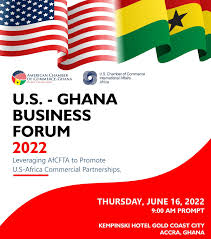 Marketing, Publishing and TV Content Programming. She is a graduate of Drexel University with a Dual MBA concentration in Financial Management and Accounting and holds a BA in Publishing with a Marketing and Editing specialization.
Marketing, Publishing and TV Content Programming. She is a graduate of Drexel University with a Dual MBA concentration in Financial Management and Accounting and holds a BA in Publishing with a Marketing and Editing specialization.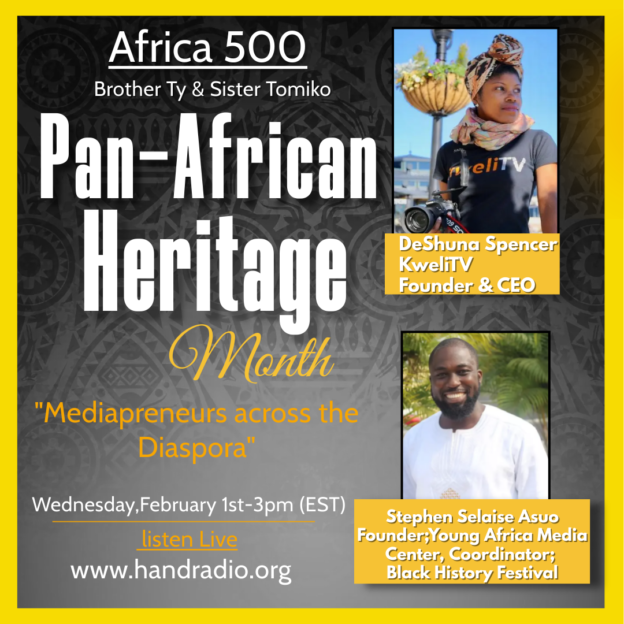
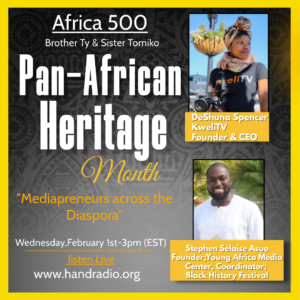 The February 1, 2023 edition of Africa 500 features guests DeShuna Spencer of KweliTV and Stephen Selaise Asuo of Young Africa Media Center and YALI TV.
The February 1, 2023 edition of Africa 500 features guests DeShuna Spencer of KweliTV and Stephen Selaise Asuo of Young Africa Media Center and YALI TV.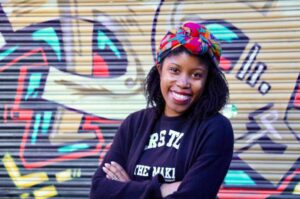
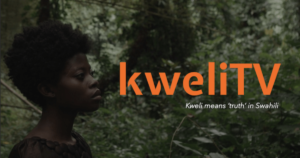 As a former journalist & radio host, DeShuna’s work focuses on the intersection of media images and implicit bias. She speaks frequently on media representation, diversity in the streaming & the OTT space, social entrepreneurship, the effects of Black trauma content, challenges & opportunities in the media landscape, starting a media tech venture, women in media & tech, and her journey as a Black founder.
As a former journalist & radio host, DeShuna’s work focuses on the intersection of media images and implicit bias. She speaks frequently on media representation, diversity in the streaming & the OTT space, social entrepreneurship, the effects of Black trauma content, challenges & opportunities in the media landscape, starting a media tech venture, women in media & tech, and her journey as a Black founder.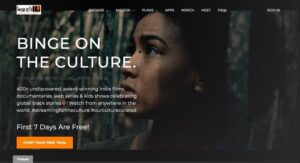 Being a niche streaming player is never easy, and the list of failed ventures is long. But as major streaming services become more expensive, bloated, and cumbersome to navigate, it may create an opportunity for smaller companies with a more specific point of view–KweliTV among them.
Being a niche streaming player is never easy, and the list of failed ventures is long. But as major streaming services become more expensive, bloated, and cumbersome to navigate, it may create an opportunity for smaller companies with a more specific point of view–KweliTV among them.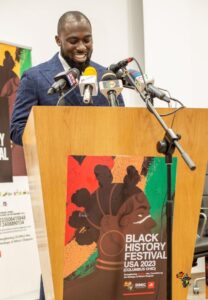
 Currently he is the founder/CEO of Young Africa Media Center and general manager of YALI TV, a fast-growing online television channel dedicated to tell the stories and impacts of YALI Alumni and young leaders across Africa. He leads over a 100 YALI TV Correspondents and associates across Africa, and the channel has covered major events on the continent in English, Portuguese and French. He is also the coordinator of the Black History Festivals which began in 2022. The 2023 Black History Festival will take place in Columbus Ohio.
Currently he is the founder/CEO of Young Africa Media Center and general manager of YALI TV, a fast-growing online television channel dedicated to tell the stories and impacts of YALI Alumni and young leaders across Africa. He leads over a 100 YALI TV Correspondents and associates across Africa, and the channel has covered major events on the continent in English, Portuguese and French. He is also the coordinator of the Black History Festivals which began in 2022. The 2023 Black History Festival will take place in Columbus Ohio. 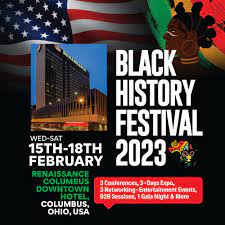 As he continues to develop content best in value-based leadership, Stephen aspires to be a renowned Media Entrepreneur and Development Communication Consultant in Ghana. Steven hopes to transform the socioeconomic fortunes of the continent through a renewed media vision for Africa through leadership, storytelling and peer partnerships.
As he continues to develop content best in value-based leadership, Stephen aspires to be a renowned Media Entrepreneur and Development Communication Consultant in Ghana. Steven hopes to transform the socioeconomic fortunes of the continent through a renewed media vision for Africa through leadership, storytelling and peer partnerships.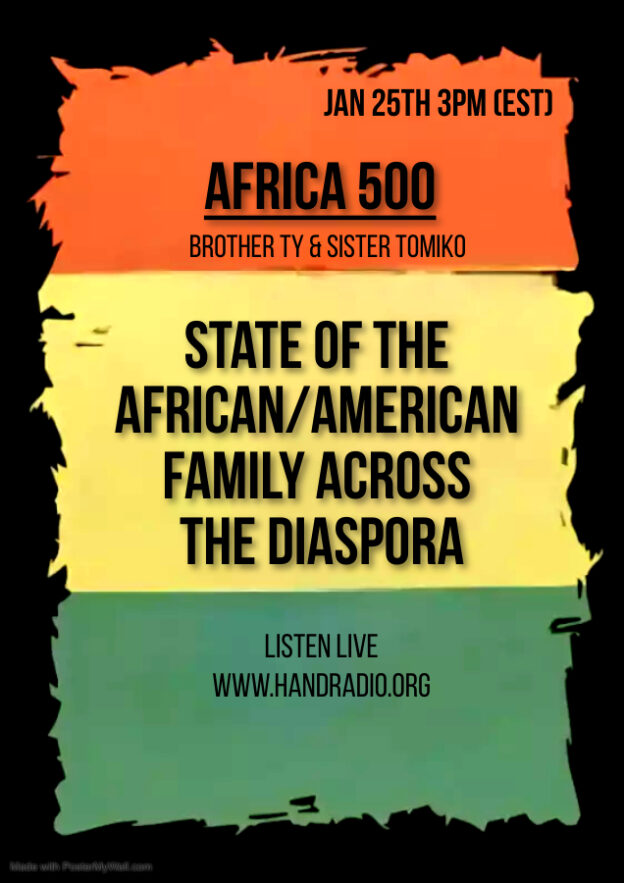
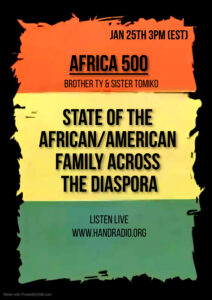 Be sure to tune in to Africa 500 on HANDRadio (
Be sure to tune in to Africa 500 on HANDRadio (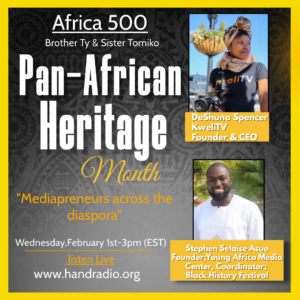 Starting on February 1, Africa 500 will launch a series of discussions in recognition of Pan-African Heritage Month (or, as some refer to it, “Black History Month”) by welcoming Sis. DeShuna Spencer, founder and CEO of KweliTV, and Stephen Selaise Asuo, founder of the Young Africa Media Center and coordinator of the Black History Festival.
Starting on February 1, Africa 500 will launch a series of discussions in recognition of Pan-African Heritage Month (or, as some refer to it, “Black History Month”) by welcoming Sis. DeShuna Spencer, founder and CEO of KweliTV, and Stephen Selaise Asuo, founder of the Young Africa Media Center and coordinator of the Black History Festival.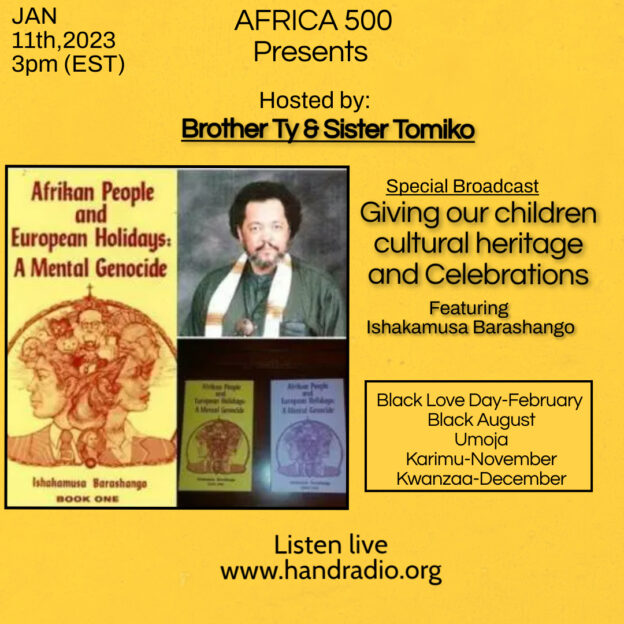
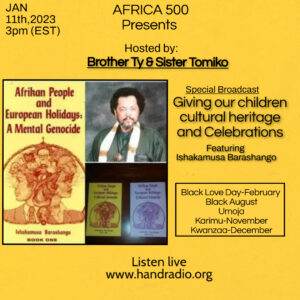 The January 11, 2023 edition of Africa 500 will feature the words of the Rev. Dr. Ishakamusa Barsashango.
The January 11, 2023 edition of Africa 500 will feature the words of the Rev. Dr. Ishakamusa Barsashango.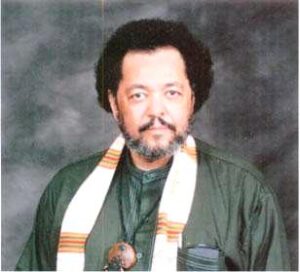 Rev. Dr. Ishakamusa Barashango, affectionately known as “Baba”, began his journey to Nsamando, the land of the Ancestors on January 14, 2004. He apparently succumbed to a heart attack during his morning walk. The dynamic minister, author, historian, educator and motivational speaker was born April 27, 1938 in Philadelphia, PA.
Rev. Dr. Ishakamusa Barashango, affectionately known as “Baba”, began his journey to Nsamando, the land of the Ancestors on January 14, 2004. He apparently succumbed to a heart attack during his morning walk. The dynamic minister, author, historian, educator and motivational speaker was born April 27, 1938 in Philadelphia, PA. As well as releasing a series of audio lecture compact disks, Dr Barashango was the author of several books including: Afrikan People And European Holidays: A Mental Genocide Book One; Afrikan People And European Holidays: A Mental Genocide Book Two; God, the Bible and the Black Man’s Destiny; Afrikan Woman: The Original Guardian Angel; and Afrikan Genesis: Amazing Stories of Man’s Beginnings. Dr Barashango was completely dedicated to the physical, mental, and spiritual liberation of New Afrikan people – he dedicated his life to this cause!
As well as releasing a series of audio lecture compact disks, Dr Barashango was the author of several books including: Afrikan People And European Holidays: A Mental Genocide Book One; Afrikan People And European Holidays: A Mental Genocide Book Two; God, the Bible and the Black Man’s Destiny; Afrikan Woman: The Original Guardian Angel; and Afrikan Genesis: Amazing Stories of Man’s Beginnings. Dr Barashango was completely dedicated to the physical, mental, and spiritual liberation of New Afrikan people – he dedicated his life to this cause!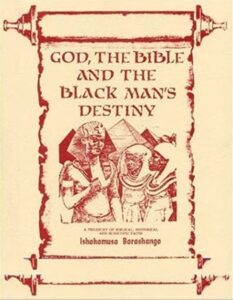 the covenant he swore with an oath to our ancestor Abraham.
the covenant he swore with an oath to our ancestor Abraham.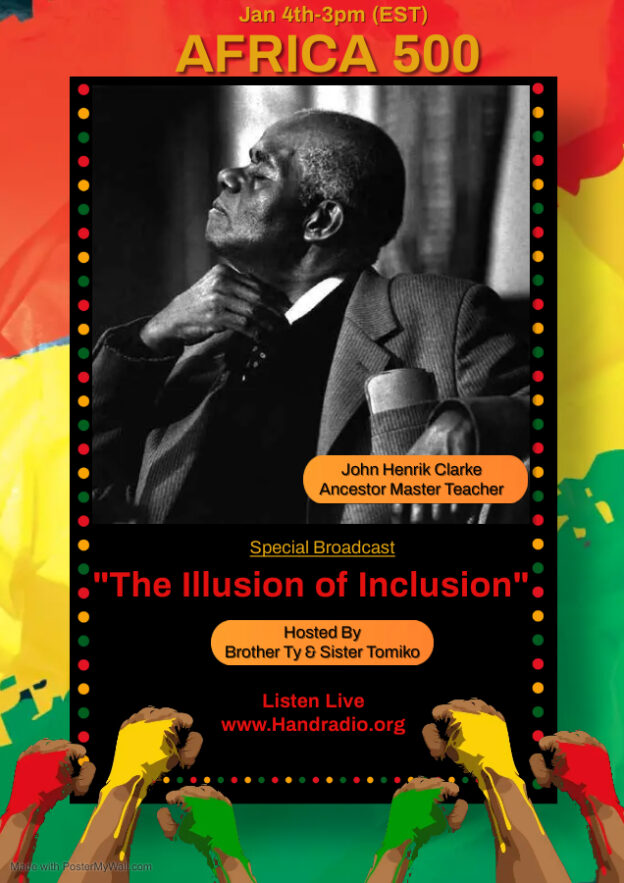
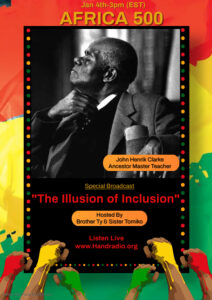 Starting in January 2023, Africa400 is now renamed
Starting in January 2023, Africa400 is now renamed 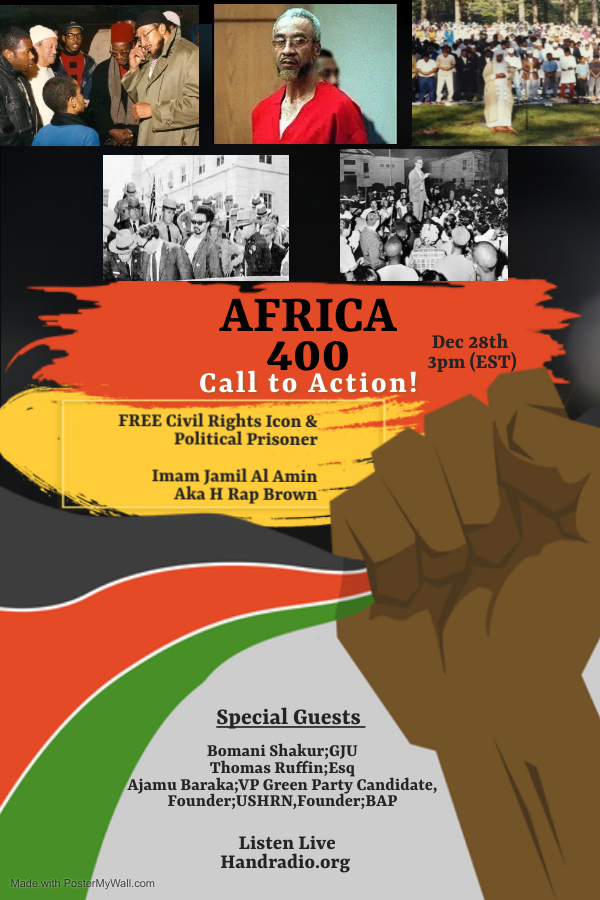
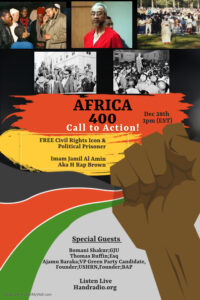 The Wednesday, December 28, 2022 edition of Africa400 discusses the case of Political Prisoner Imam Jamil Al-Amin and the actions that must be taken to secure his exoneration and freedom. Show Hosts Sis. Tomiko and Bro. Ty welcome the following powerful guests:
The Wednesday, December 28, 2022 edition of Africa400 discusses the case of Political Prisoner Imam Jamil Al-Amin and the actions that must be taken to secure his exoneration and freedom. Show Hosts Sis. Tomiko and Bro. Ty welcome the following powerful guests: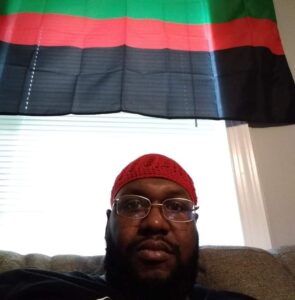 Bomani Uhuru Jihad Shakur is the National Minister of Information of The Provisional Government of The Republic of New Afrika (PG-RNA). He has been a Conscious New Afrikan Citizen since 2002. Serving in various capacities within the PG including Deputy Minister of Youth, Minister of Information, New Afrikan Nation Day Planning Committee and Co-Host of the Provisional Government of The Republic of New Afrika Radio Show. Locally he is the Minister of Information of the People’s Party for Independence (PPI) in the New Afrikan Population District of Baba Dr. John Henrik Clarke Town aka Columbus, Georgia. Brother Bomani is a local representative of IJAN (Imam Jamil Action Network). Minister Bomani is Vice Chancellor of George Jackson University (GJU), Host of George Jackson University Radio and Acting Spokesperson for George Jackson University. Bomani Uhuru Jihad Shakur is an active member of BAOC (Black August Organizing Committee). Bomani is a member of the Re-Build Newspaper Distribution Collective. Aside from his local activities and national kazi, he is a New Afrikan Propagandist, New Afrikan Ourstorian [“It’s Our Story not his story (history)”], Educator, Activist, Advocate of Captured New Afrikan Citizens (i.e. New Afrikan Political Prisoners), New Afrikan Prisoners of War as well as political prisoners of other movements such as the Black Liberation Movement. Comrade Bomani is committed to presenting ourstorical narrative via radio, literature, written correspondence and conversation.
Bomani Uhuru Jihad Shakur is the National Minister of Information of The Provisional Government of The Republic of New Afrika (PG-RNA). He has been a Conscious New Afrikan Citizen since 2002. Serving in various capacities within the PG including Deputy Minister of Youth, Minister of Information, New Afrikan Nation Day Planning Committee and Co-Host of the Provisional Government of The Republic of New Afrika Radio Show. Locally he is the Minister of Information of the People’s Party for Independence (PPI) in the New Afrikan Population District of Baba Dr. John Henrik Clarke Town aka Columbus, Georgia. Brother Bomani is a local representative of IJAN (Imam Jamil Action Network). Minister Bomani is Vice Chancellor of George Jackson University (GJU), Host of George Jackson University Radio and Acting Spokesperson for George Jackson University. Bomani Uhuru Jihad Shakur is an active member of BAOC (Black August Organizing Committee). Bomani is a member of the Re-Build Newspaper Distribution Collective. Aside from his local activities and national kazi, he is a New Afrikan Propagandist, New Afrikan Ourstorian [“It’s Our Story not his story (history)”], Educator, Activist, Advocate of Captured New Afrikan Citizens (i.e. New Afrikan Political Prisoners), New Afrikan Prisoners of War as well as political prisoners of other movements such as the Black Liberation Movement. Comrade Bomani is committed to presenting ourstorical narrative via radio, literature, written correspondence and conversation.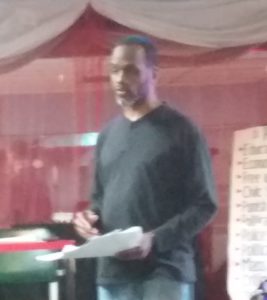 Thomas Ruffin is a founding member of the International Association of Black Lawyers, a group of highly competent, radical Black lawyers who came together in 2017 for the liberation and uplift of Black people and the poor throughout the world. As a lawyer, Thomas Ruffin practices in the United States, principally in the District of Columbia and Maryland. As an activist, Thomas Ruffin fights against injustice anywhere. Indeed, Mr. Ruffin served as the public information lawyer in the campaign to free Troy Anthony Davis, a Black man wrongfully executed by the racist state of Georgia in September 2011. Thomas Ruffin also served as a member of the Jericho National Movement, a nonprofit organization that aimed to liberate political prisoners held captive in the United States.
Thomas Ruffin is a founding member of the International Association of Black Lawyers, a group of highly competent, radical Black lawyers who came together in 2017 for the liberation and uplift of Black people and the poor throughout the world. As a lawyer, Thomas Ruffin practices in the United States, principally in the District of Columbia and Maryland. As an activist, Thomas Ruffin fights against injustice anywhere. Indeed, Mr. Ruffin served as the public information lawyer in the campaign to free Troy Anthony Davis, a Black man wrongfully executed by the racist state of Georgia in September 2011. Thomas Ruffin also served as a member of the Jericho National Movement, a nonprofit organization that aimed to liberate political prisoners held captive in the United States.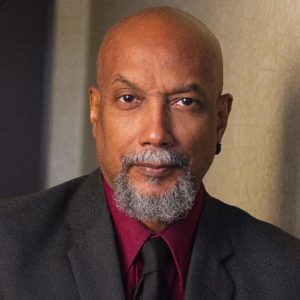 A human rights defender whose experience spans four decades of domestic and international education and activism, Ajamu Baraka is a veteran grassroots organizer whose roots are in the Black Liberation Movement and anti-apartheid and Central American solidarity struggles.
A human rights defender whose experience spans four decades of domestic and international education and activism, Ajamu Baraka is a veteran grassroots organizer whose roots are in the Black Liberation Movement and anti-apartheid and Central American solidarity struggles.